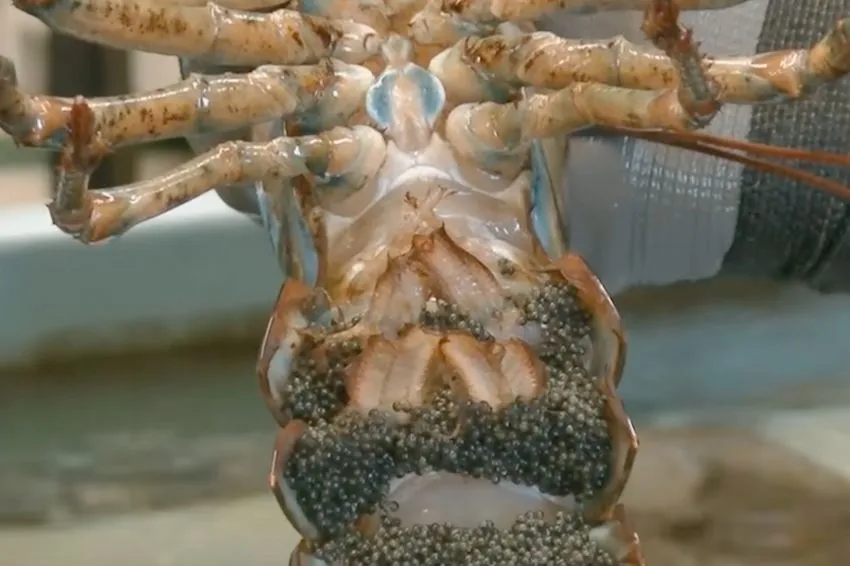Lobster is a popular seafood delicacy that many people around the world enjoy. However, only some know that lobster eggs are also edible.
Lobster eggs, also known as roe or coral, are considered a delicacy in some cultures and are often used in various dishes.
Can You Eat Lobster Eggs?
Yes, you can eat lobster eggs, also known as roe. They are considered a delicacy in some cultures and can be prepared in several ways, such as cooked or raw. However, it’s important to note that not all lobsters have eggs, and the ones that do may not have a lot. So, it can be challenging to get your hands on lobster eggs.
In this section, I will share some information about the edibility of lobster eggs.
Firstly, it is essential to note that not all lobsters have eggs. Only female lobsters carry eggs, typically found in the tail section. The eggs are small, bright orange, and taste slightly sweet. However, they are only for some, and some may find the texture or taste unappealing.
If you want lobster eggs, ensuring they are adequately cooked is crucial. Eating raw lobster eggs can be dangerous as they contain harmful bacteria or toxins. The best way to cook lobster eggs is to steam them for a few minutes until they turn red. You can then serve them as a garnish or mix them into a dish.
Another thing to remember is that lobster eggs are less widely available than other parts of the lobster. They are typically only found in live lobsters; not all lobster sellers carry them. If you want to try lobster eggs, it may be worth checking with your local seafood market or restaurant to see if they are available.
Health Benefits and Nutritional Value Lobster Eggs
When it comes to lobster eggs, they are not only edible but also packed with nutrients. They are considered a delicacy in many cultures around the world. Here are some of the benefits and nutritional value of lobster eggs.
Protein Content
Lobster eggs are an excellent source of protein, which is essential for building and repairing tissues in the body. One cup of cooked lobster eggs contains approximately 29 grams of protein, more than the protein in a cup of cooked chicken or beef.
Vitamin and Mineral Content
Lobster eggs are also loaded with vitamins and minerals essential for maintaining good health. Here are some of the critical nutrients found in lobster eggs:
- Vitamin B12: One cup of cooked lobster eggs provides approximately 51% of the recommended intake of vitamin B12. This vitamin is vital for maintaining healthy nerve cells and red blood cells.
- Copper: One cup of cooked lobster eggs contains approximately 198% of the daily recommended intake of copper. Copper is essential for maintaining healthy bones, blood vessels, and nerves.
- Selenium: One cup of cooked lobster eggs provides approximately 190% of the daily recommended selenium intake. This mineral helps to protect against oxidative damage and is essential for maintaining a healthy immune system.
- Zinc: One cup of cooked lobster eggs contains approximately 53% of the recommended zinc intake. Zinc is essential for maintaining a healthy immune system and for wound healing.
Lobster eggs are a nutritious and delicious food that can provide a wide range of health benefits. Whether you enjoy them alone or as part of a larger meal, you can feel good about adding lobster eggs to your diet.
Culinary Uses of Lobster Eggs

One of the lesser-known parts of an edible lobster is its eggs, also known as roe. In this section, I will discuss the culinary uses of lobster eggs.
In Gourmet Cuisine
Lobster eggs are considered a delicacy in gourmet cuisine. They are often used as a garnish or topping for sushi, pasta, and salads. Lobster eggs have a mild flavor and a slightly crunchy texture that pairs well with various dishes.
In addition to being used as a garnish, lobster eggs can be incorporated into sauces and dressings. For example, a creamy lobster egg sauce can be drizzled over grilled fish or vegetables to add a rich and savory flavor.
In-Home Cooking
While lobster eggs are commonly used in gourmet cuisine, they can also be enjoyed at home. Lobster eggs are often used as a substitute for caviar, which can be expensive and hard to find.
One way to enjoy lobster eggs at home is to add them to scrambled eggs or omelets. The eggs can also be used as a topping for baked potatoes or mixed into a creamy dip.
When seasoning lobster eggs, it’s best to keep it simple. A sprinkle of salt and pepper is all needed to enhance the natural flavor of the eggs. However, you can experiment with different herbs and spices to create unique flavor combinations.
Potential Risks and Allergies of Lobster Eggs
As with any food, consuming lobster eggs has potential risks and allergies. Here are some things to keep in mind:
- Allergies: Lobster eggs contain high protein levels, which can trigger an allergic reaction in some people. If you have a known shellfish allergy, it’s best to avoid eating lobster eggs altogether. Even if you don’t have a shellfish allergy, it’s always a good idea to start with a small amount and monitor your body’s reaction before consuming more significant quantities.
- Bacterial Contamination: Raw or undercooked lobster eggs can harbor harmful bacteria such as salmonella and listeria. Cooking lobster eggs is crucial to kill potential bacteria and reduce the risk of foodborne illness.
- Mercury Content: Like many types of seafood, lobster eggs can contain high levels of mercury. While moderate consumption of lobster eggs is generally considered safe for most people, it’s best to limit your intake if you’re pregnant or nursing, as high mercury levels can harm developing fetuses and infants.
Lobster eggs can be a delicious and nutritious addition to your diet, but it’s essential to be aware of the potential risks and take steps to minimize them. If you have concerns about consuming lobster eggs, it’s always a good idea to consult a healthcare professional.
Sustainability and Ethical Considerations
When eating lobster eggs, sustainability and ethical considerations are important to remember. As someone who enjoys seafood, I want to make sure that I am making responsible choices that support the health of our oceans and the people who rely on them.
One of the biggest concerns with lobster eggs is overfishing. Lobster populations have declined in some areas due to overfishing and habitat destruction. As a result, it’s essential to choose lobster eggs from sustainable sources. Look for labels that indicate the lobster eggs were harvested using sustainable fishing practices, such as trap fishing.
Another ethical concern with eating lobster eggs is the treatment of the animals. Lobsters are often kept in crowded tanks and transported long distances, which can be stressful and harmful to their health. It’s vital to choose lobster eggs from sources that prioritize animal welfare, such as those that use humane harvesting methods and avoid overcrowding.
In addition to choosing sustainable and ethical sources for lobster eggs, there are other steps you can take to minimize your impact on the environment. For example, consider reducing your overall seafood consumption and choosing plant-based options more often. You can also support organizations that protect marine habitats and promote sustainable fishing practices.
FAQ
As someone who loves lobster, I often get asked about the edibility of lobster eggs. Here are some of the most common questions I get asked, along with my answers:
The taste of lobster eggs can vary depending on how they are prepared. Some people describe them as having a sweet, briny flavor, while others say they taste like the ocean. If you’re not sure whether you’ll like the taste, it’s best to try a small amount first.
Lobster eggs are a good source of protein, omega-3 fatty acids, and vitamins D and B12. However, they are also high in cholesterol, so it’s important to eat them in moderation if you’re watching your cholesterol levels.
Female lobsters carry their eggs on their tails, so it’s easy to tell if a lobster has eggs. The eggs are small and black when they are first laid, but they turn red as they mature. If you’re not sure whether a lobster has eggs, ask your fishmonger or chef. They should be able to tell you.





Leave a Reply
You must be logged in to post a comment.